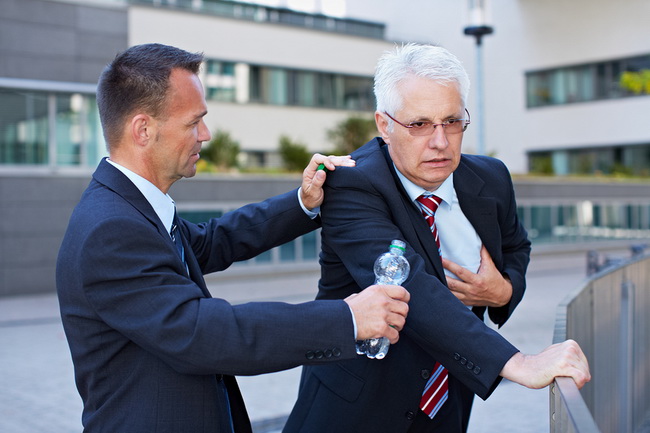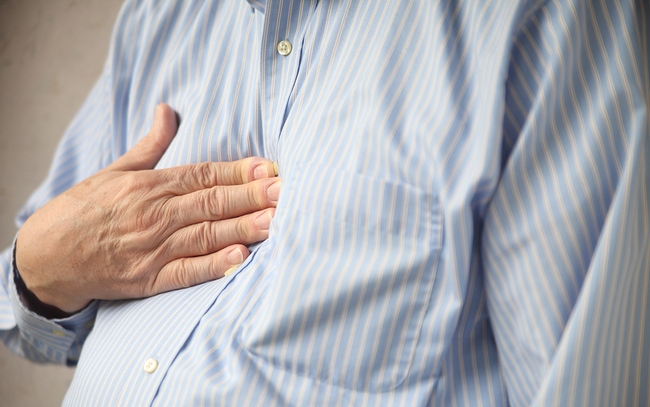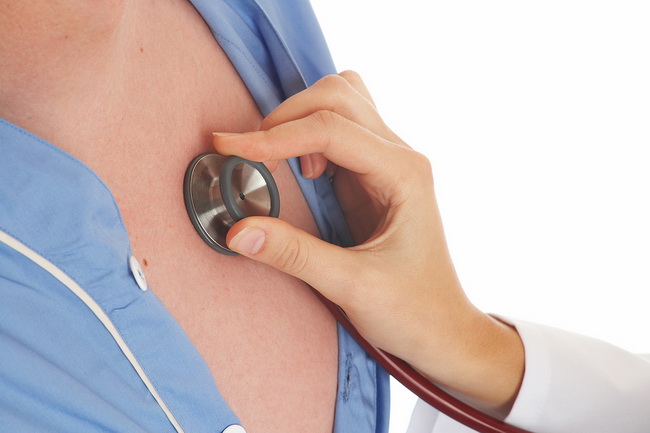- Make It Yourself Lavender Heart-Shaped Bath Bombs!
- 20 Things You Never Knew About “Down There”
- 12 Best Foods For Those Suffering From Arthritis Pain
- 12 Personal Hygiene Mistakes Almost Everyone Makes (Mom Never Told You About #4!)
- 15 Medicinal Plants And Herbs From The Cherokee People
- 12 Mind-Blowing Benefits Of Drinking Coconut Water During Pregnancy
- 12 Outstanding Winter Foods That Won’t Fatten You Up Like A Christmas Turkey
Top 12 Warning Signs Of A Heart Attack You Should Never Ignore! (#4 — Who Knew?)

Photo credit: bigstock.com
You might think that cancer is the number one killer in America, but the truth is that it doesn’t even come close to heart disease. Heart disease accounts for 40 percent of all deaths in the U.S. That makes this killer more deadly than all the forms of cancer combined!
What makes heart disease so deadly? One of the main problems is that people are slow to seek help and recognize the symptoms. If you were suddenly gripped with a terrible chest pain, you would call 911, but heart attacks do not always come with such an obvious sign.
Because a heart attack is easier to stop than to recover from, you should become aware of some of its warnings signs and never ignore them. Too many people wonder if they might be having a heart attack and waste valuable, lifesaving time trying to see if it will go away or blaming their symptoms on other causes, such as muscle soreness or simple indigestion. Heart attack symptoms can vary from person to person, even between the genders, so do not wait to call 911 if you find you are experiencing any of the following 12 symptoms. This is especially true if you are over 65, or if you have other high risk factors such as being a smoker, obesity, hypertension, high cholesterol, diabetes, or if you have a family history of heart disease.
Keep reading and become familiar with the top 12 warnings signs of a heart attack. You might save your own life or the life of someone you love.
1. Discomfort in the Chest
This might seem obvious, and it is the classic sign of a heart attack, but keep in mind that this isn’t the only sign. Sometimes chest pain can come from other ailments that have little or nothing to do with the heart. Most heart-related chest pain is centered under the breastbone. Some say it feel as if they had a huge weight sitting on their chest, others describe it as a mild aching. Others, especially women, say that they feel a burning sensation in their chest, not so much a “pain” or “pressure”. Many people believe they have heartburn, and don’t recognize it for what it is.
2. Weakness
Many people, in the days leading up to a heart attack, often say that they feel severe, unexplained weakness. Some people have stated that they felt so weak, they couldn’t even hold a pencil. Any unexplained weakness this extreme should be checked out immediately. Call 911 or go to a hospital emergency room.
3. Swelling
Most people believe that swelling of the feet or ankles has to do with standing or sitting too much, but heart failure can also cause fluid to accumulate in the body. This can cause swelling in the legs or abdomen, as well as the feet and ankles. Some people begin to retain so much fluid that that they find they suddenly gain weight (sometimes as much as 10 pounds!). When this happens, many people lose their appetite as well.
Continue to Page 2

Photo credit: bigstock.com
4. Sweating
It is a common symptom of a coming heart attack to break out in a cold sweat (unless you are sitting in a very hot room or going through menopause). If you are sitting, standing, or not doing anything strenuous, but you suddenly break out in drenching sweat, call 911 right away. This is much more common than you think. Many people want to lie down, but do so only after calling 911.
5. Anxiety
Many survivors state that they had feelings of impending doom or anxiety attacks just before their heart attacks happened. Although many people with anxiety attacks believe that they are having a heart attack, it is better to be safe than sorry. Call 911.
6. Coughing
Some people who are having heart failure will cough up bloody phlegm, but others simply have a nagging or wheezing cough that is sometimes a symptom of heart failure. This is a result of fluid build-up in the lungs. It is especially important that you pay attention to this symptom if you are having any of the other symptoms listed here as well.
Continue to Page 3

Photo credit: bigstock.com
7. Nausea
Just before a heart attack occurs, it is not uncommon for people to feel nauseous, sick to their stomach, or even to vomit. This is especially common for those who have swelling in the abdomen due to fluid accumulation. They can lose their appetite, but still feel nauseous and have the “dry heaves.”
8. Dizziness
Potentially dangerous heart rhythm abnormalities, known as arrhythmias, as well as heart attacks themselves can make one feel lightheaded, dizzy, and even cause a lack of consciousness.
SEE ALSO: 15 of the Best Herbs and Spices for a Healthy Heart (#10 is Little Weird)
9. Pain In Other Parts Of The Body
For many heart attack victims, the pain begins in the chest, and then spreads to the shoulders, arms, elbows, neck, jaw, back, and even abdomen. However, sometimes there is no actual chest pain — only pain in some of these other body parts. Pain between the shoulder blades or pain in one or both arms is especially common. This pain can come and go, so don’t let it fool you.
Continue to Page 4

Photo credit: bigstock.com
10. Fatigue
Especially in women, unusual fatigue can occur in the weeks, days, or even just moments before a heart attack happens. Feeling extremely tired all the time can be an early symptom of an impending heart attack. Obviously, you can feel exhausted after a hard day at work, so how can you tell the difference? This kind of exhaustion leaves you feeling unwell and as if you were run over by a truck. Unless you ran a marathon, don’t assume this is nothing. Call 911.
11. Shortness of Breath
If you are gasping for breath with minimal exertion, or if you are doing nothing, you could have chronic obstructive pulmonary disease (COPD), asthma, or even pneumonia. However, you could also have a pending heart attack or heart failure, especially if it comes on suddenly.
12. Rapid or Irregular Pulse
Everyone has an occasional skipped heartbeat or a felt a little flip flop in the chest, but an irregular pulse, or a very rapid pulse, especially when combined with any of the other symptoms on this list, can be evidence of heart failure, heart attack, or arrhythmia. If left untreated, arrhythmias can lead to stroke, heart failure, or even sudden death. Don’t wait to see if this feeling will pass — call 911 immediately.
Don’t try to tough out the symptoms or ignore them, hoping that they will go away. If your symptoms last more than five or 10 minutes, call 911 or have someone drive you to your local hospital emergency room. You can also chew and swallow an aspirin, unless you are allergic to them.
References:
































